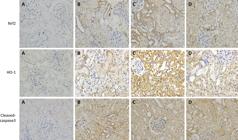Abstract
Purpose
To investigate the effects of grape seed proanthocyanidin B2 (GSPB2) preconditioning on oxidative stress and apoptosis of renal tubular epithelial cells in mice after renal ischemia-reperfusion (RIR).
Methods
Forty male ICR mice were randomly divided into 4 groups: Group A: mice were treated with right nephrectomy. Group B: right kidney was resected and the left renal vessel was clamped for 45 minutes. Group C: mice were intraperitoneally injected with GSPB2 before RIR established. Group D: mice were intraperitoneally injected with GSPB2 plus brusatol before RIR established. Creatinine and urea nitrogen of mice were determined. Pathological and morphological changes of kidney were checked. Expressions of Nrf-2, HO-1, cleaved-caspase3 were detected by Western-blot.
Results
Compared to Group B, morphology and pathological damages of renal tissue were less serious in Group C. Western-blot showed that expressions of Nrf-2 and HO-1 in Group C were obviously higher than those in Group B. The expression of cleaved-caspase3 in Group C was significantly lower than that in Group B.
Conclusion
GSPB2 preconditioning could attenuate renal oxidative stress injury and renal tubular epithelial cell apoptosis by up-regulating expressions of Nrf-2 and HO-1 and down-regulating the expression of cleaved-caspase-3, but the protective effect could be reversed by brusatol.
Grape Seed Extract; Proanthocyanidins; Reperfusion Injury; Oxidative Stress; Apoptosis; Mice

 Thumbnail
Thumbnail
 Thumbnail
Thumbnail
 Thumbnail
Thumbnail
 Thumbnail
Thumbnail
 Thumbnail
Thumbnail
 Thumbnail
Thumbnail
 Thumbnail
Thumbnail






